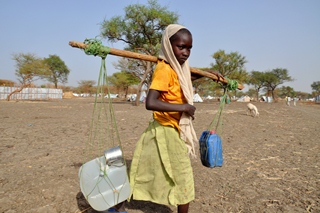Over 37,000 Sudanese refugees in desperate need of aid: Oxfam
May 2, 2012 (JUBA) – Water shortages and disease are affecting tens of thousands of refugees in South Sudan’s Jamam camp in Upper Nile state and they need to be moved to a new site, according to Oxfam.

“We are fast running out of time and options in the midst of a huge humanitarian crisis. We have drilled for water and carried out a geological survey, but there is simply not enough ground water available to sustain the growing number of people who need it. Women have to queue for hours in the burning sun just to collect a fraction of the water they need, and the situation is getting more desperate by the day,” said Pauline Ballaman, Oxfam’s head of operations in Jaman.
“The only solution is for people to be moved urgently,” she added.
Oxfam and other organisations have produced alternative water sources which are neither reliable nor safe and will be incapable of providing for the growing needs of an increasing refugee population.
With heavy rains anticipated in the coming weeks, Oxfam says, the relocation of refugees and the delivery of aid will become more difficult.
It will also increase the threat of diseases such as malaria and cholera, and destroy the make-shift shelters erected by the refugees.
Since December, nearly 37,000 refugees have arrived in Jamam, according to Oxfam. They fled the on-going conflict in Sudan’s Blue Nile state, and more continue to arrive.
Over 100,000 people have been forced to flee Sudan because of the conflict in Blue Nile and South Kordofan, and hundreds of thousands more have been displaced within Sudan.
Oxfam advocates for a “sustainable solution to the crisis, whereby all parties negotiate for long-term peace in Blue Nile, Southern Kordofan and the rest of the border region, so that refugees can return home.”
It has has urged all agencies and local authorities to urgently prepare a new safe and secure site for 23,000 people, where long-term water sources can be found.
(ST)
